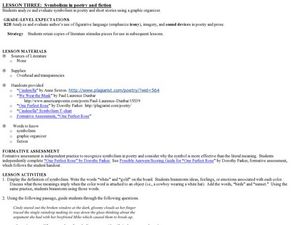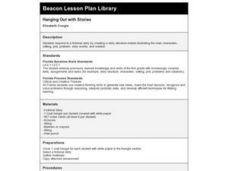Curated OER
The Martian Chronicles: Concept Analysis
If you're planning on including Ray Bradbury's The Martian Chronicles in your science fiction unit, use a concept analysis guide to frame your instruction. It covers literary elements such as setting, narrative voice, and theme, as well...
University of North Carolina
Literature (Fiction)
An informative installment of the Writing for Specific Fields series helps readers learn how to interpret and write about fiction. The website details nine easy steps for writing a literary analysis—a useful method for all readers!
Curated OER
Analyzing Literary Devices
Eighth graders identify figurative language and poetry in this literary analysis lesson. Using Through the Looking Glass by Lewis Carroll and a YouTube video for "The Walrus and the Carpenter," young readers complete a literary device...
Curated OER
Thinking about Theme
Sixth graders explore theme in science fiction texts by examining how plot conflicts are resolved. This resource focuses on Madeleine L'Engle's A Wrinkle in Time, but the approach and guiding questions could apply to a variety of texts.
All for KIDZ
Building Relationships: The Orphan of Ellis Island
Family and friendship are two very important themes of the historical fiction novel The Orphan of Ellis Island by Elvira Woodruff. From video clips and writing prompts to reader's theater and family interviews, this resource provides...
Curated OER
Writing Short Stories: The Fun Way
Do your young authors suffer from writer's block when they try to write short stories? Access their natural creativity with C-Gor, the writing monster! The instructional activity takes aspiring authors through a new writing process...
Curated OER
Identifying Science Fiction
Pupils discuss works of science fiction that they read, highlight aspects that made each a part of science fiction genre, identify formal literary elements, and discuss ways each can be developed through science fiction.
Curated OER
Identifying the Theme in a Story
Students recognize Theme through the use of simple, short stories. Using Pro Quest, students begin by researching the literary element, theme, and how it can be identified. They then identify the themes in Aesop's Fables and other short...
Curated OER
Symbolism in Poetry and Fiction
Students examine the use of symbolism in literature. In this literary elements instructional activity, students discuss the attributes of symbolism. Students then read selected Cinderella stories and "The Fall of the House of Usher," and...
Curated OER
Identify and Analyze Literary Concepts
Students explore plot structure, conflict, setting, and mood. In this literary elements lesson, students read Rosa Parks, My Story and complete the provided plot outline worksheets. Students discuss the text elements of non-fiction pieces.
K20 LEARN
Freedom And Restraint: Elements Of Fiction
Kate Chopin's short story, "The Story of an Hour" and John H. Young's "Our Deportment, or the Manners, Conduct, and Dress of Refined Society" offer high school juniors an opportunity to compare the role of women in the 19th century with...
Curated OER
Creating a Science Fiction Story
As the culminating activity in a unit study of science fiction, young writers demonstrate their understanding of the genre by producing their own graphic novel. After deciding on the main elements of their story, individuals use a comic...
Curated OER
Introduction To Literary Analysis
Explore the fascinating ways in which authors use specific literary devices to create interesting and realistic texts. Using non-fiction articles with the subject of rogue waves, an excerpt from The Perfect Storm, by Sebastian Junger,...
Curated OER
Pebbles, Sand and Silt -- Categorizing Fiction and Informational Books
Primary readers complete the activities in a Pebbles, Sand and Silt FOSS kit. As a class, they are given a group of rocks and they are to categorize them based on their activities in the FOSS kit. They use this information and apply it...
Pennsylvania Department of Education
Exploring Key Ideas and Details in Fiction and Nonfiction
Third graders participate in activities to differentiate fiction from nonfiction. In this fiction activity, 3rd graders describe the elements of a fiction story. Students compare and contrast fiction and non fiction elements. Students...
Curated OER
Elements of Fiction Study Guide
Class members must provide definitions for a list of literary terms. The resource could be used as a notebook reference sheet, as a review, or as a group work activity.
Curated OER
Hanging Out with Stories
Help your class listen and respond to a fictional story by creating a story structure mobile illustrating the main characters, setting, plot, problem, story events, and solution. Using a coat hanger, they will create an artistic element...
Curated OER
Analyzing the Use of Irony in a Short Story
Ninth graders examine how literature connects to real-life and see how irony aids in the development of theme. They read Shirley Jackson's The Lottery, and discuss elements of foreshadowing and situational irony. Then learners will write...
Curated OER
Understanding Core Values Using the Frayer Model
Students complete the Frayer Model. In this literature lesson, students review the concept of theme in literature. Students identify major themes in books they've read. Students learn the attributes of the Frayer Model and then complete...
Curated OER
Poetry Project
Choosing a poet or a theme, eighth graders conduct research in the world of poetry. They conduct Internet research and select five poems that fit their poet or theme, and create a seven slide PowerPoint presentation on their selected...
National Endowment for the Humanities
Magical Elements in Magical Realism
How does Gabriel Garcia Marquez make the magical elements of his novel appear so real? That's the challenge facing readers of One Hundred Years of Solitude. Scholars examine the tone and descriptive details Garcia Marquez uses to make...
Curated OER
Different Strokes For Different Folktales
Young readers use graphic organizers, such as Venn diagrams and story maps, to analyze a variety of folktales and the elements of a story. They use writing, sequencing activities, and creative art to identify the morals learned from a...
Curated OER
Rudyard Kipling's "Rikki-Tikki-Tavi": Mixing Fact and Fiction
"Rikki-Tikki-Tavi," from The Jungle Book, offers young readers a chance to examine how Rudyard Kipling uses setting and personification to bring to life the brave mongoose who battles cobras to protect his family. Class members explore...
Curated OER
Historical Fiction: Island of the Blue Dolphins
Island of the Blue Dolphins, Scott O'Dell's classic tale of Karana, a young girl stranded on an island off the California coast, is the focus of a 16-slide presentation that includes a list of vocabulary words, guided reading questions,...

























